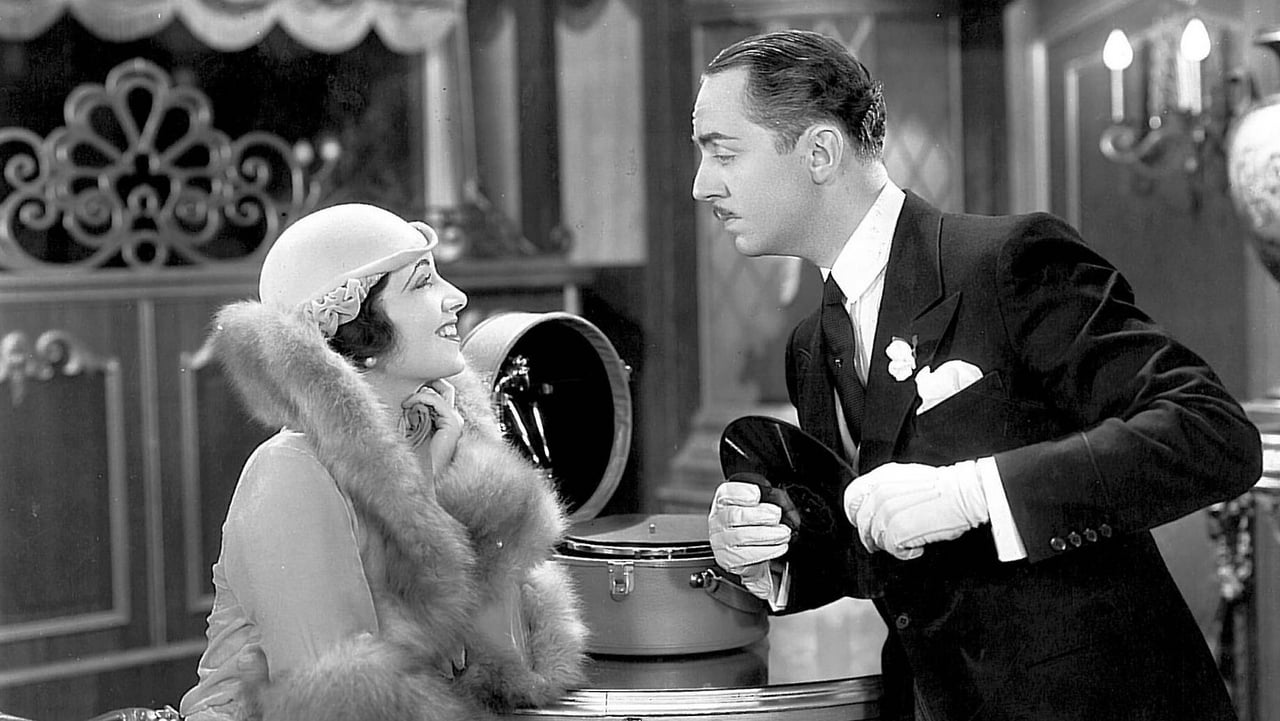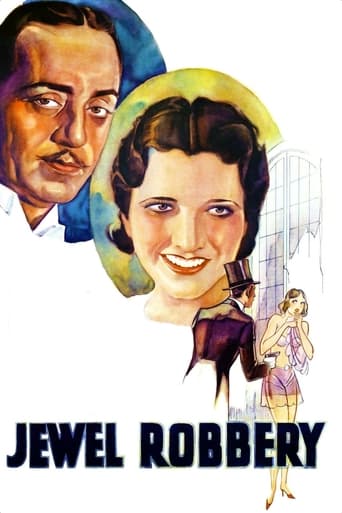

William Powell and Kay Francis made half a dozen movies together. Two of them were billed as comedies and they are their best. They were made and released within a few months of each other in 1932. The last one was more of a drama and love story, "One Way Passage." This film, "Jewel Robbery," is a caper comedy set in Vienna, Austria. It has a lot of dialog, mostly between the two leads. Powell plays the robber, whose name we never learn. Francis plays Baroness Teri, a wealthy and bored socialite who loves jewels, looks for excitement, and has had an adulterous affair with a diplomat she now wants to dump.Powell heads a large gang of jewel thieves who pull off a jewelry store heist in broad daylight. They've been doing this for some time and haven't been caught. The baroness and her friend, Marianne (played by Helen Vinson), lead lives centered around pleasure. Others in their wealthy circle are Teri's husband, Baron Franz (played by Henry Kolker), her lover Paul (played by Hardie Albright), and Marianne's husband, Count Andre (played by Andre Luguet). Alan Mowbray has a nice double role in the film as the robber's butler, Fritz, who also poses as a detective. And, Spencer Charters is very good as Johann Christian Lenz of the Vienna Protective Agency. The plot is simple, but far-fetched with a little melodrama at times that weakens it. This is mainly a two-person stage production of the Powell and Francis characters trying to seduce the other in subtle ways. It is done with verbal repartee and innuendo. There is humor and comedy here, obviously, and some satire of foreign police and the lifestyles of the wealthy. It also pans the character of a small segment of society as wastrels. Viewers in modern times should recall that this film was made in 1932. It was the heart of the Great Depression. Unemployment in the U.S. was 25 percent and it was over 30 percent in Austria. The depression was devastating on both the rich and the poor. So, here we have a film in which the place and people of the story seem oblivious to the world reality. But audiences who were going to see it were very much living in the reality of the time. Moviegoers in the 21st century, so far removed from the reality of the time and place, will see this film in a quite different light than the moviegoers of that time. Today, we may smile at the humor and waywardness of the baroness, and the comedy of the robbery. But in the 1930s -- even with the satire that more people would have seen, the public couldn't accept this escapist entertainment from the harsh reality of the day. And, the critics didn't think much of Francis' performance. The script doesn't try to hide the broader "messages" of the film. Consider this self-appraisal and confession by Baroness Teri with Paul. "I'm not a fine woman. In my own eyes, I'm shallow and weak." Paul, "But why?" Teri, "Because I go on living a shallow and weak life when, with a little courage, I could break away from it. I have all of the qualities to make quite a decent person, and what have I done with them? I fly about all day pursuing food, jewels, excitement. I don't love. I don't even suffer. I have nothing except boredom. In the morning, a cocktail. In the afternoon, a man. In the evening, very dull. That my dear minister of state is my picture of your Teri."Some reviewers think the cigarettes doping is marijuana. But, would a few puffs of "weed" lead men to the states we see here? And, what gives it a pleasant aroma? I think it was supposed to be cigarettes laced with opium. Expensive brands of perfumed cigarettes were common in Europe. I've smoked them in France and Germany. Laced with opium, one such smoke would likely put a man to sleep for several hours, as in this film. Opium and coke then were the big social drugs in Europe. They were even legal in England in the 19th century. This isn't nearly as good as most of the hilarious comedies and caper films that Powell made later. Incidentally – those came after the Hays code began to be enforced by the studios that established the code in the first place. But this is an adult film that most adults should enjoy. Viewers will enjoy it all the more who see the satire that viewers living in the hard times of the 1930s found it hard to enjoy. Here are a few of my favorite lines from the film – some acerbic, some satiric, some just funny. Baron Franz, "You use what weapons you can to get money – against a rich man, a revolver, against a poor one, his poverty. Isn't that right, Paul?" Paul, "Of course! We diplomats too are only effective when we have power and use it."The robber, "You're so lovely, it's hard to be brutal with you." Teri, "You do strike a fresh note. Up to now, men have always been brutal because I am lovely."Lenz (of the Austrian Protective Service), "What would happen if they started locking cabinet members in vaults as a regular habit?" Baron, "The country would probably have some peace."Teri, "Even though he's a robber to us, he stormed that shop like a hero."The robber, "I'd have allowed a lot more time for this robbery if I'd known you'd be here."Teri, "You can't invite me to do anything. Whatever you do must be by force."The robber, "Even a robber has to look out for burglars."
... View MoreHere's a genuine find! This film was actually based on a stage play (not a story as most references have it). Admittedly, this stage origin is not readily noticeable, even though very little attempt has been made to open it out. The reason the movie succeeds so well, lies in the super-fast and most ingratiating manner in which the players, particularly William Powell, deliver their clever, witty lines. Miss Francis does reasonably well too, although she is no match for Powell and is even overshadowed by Henry Kolker (I loved his amusing bit with the ring in his mouth) and Spencer Charters (who – in one of the biggest roles of his career – so delightfully plays a dumb night-watchman). Dialogue director William Keighley's insistence on fast dialogue delivery is matched by the equally fast camera movement demanded by director William Dieterle. Crisp film editing and some wonderfully Germanic lighting and atmospheric sets all contribute. In fact the movie often has a real European look about it. Best of all, it runs less than 80 minutes, and there is not a single slack moment from go to whoa.
... View MoreCharming jewel thief William Powell's gang robs a jewelry store while bored baroness Kay Francis is there, along with her husband and her lover. Francis is immediately attracted to the suave criminal. Later, after the robbery, Powell tracks Francis down and tries to convince her to come away with him.Chic comedy with a great performance from William Powell. Kay Francis and Helen Vinson are good as a couple of slutty aristocrats. Talky but light and fun. Lots of Pre-Code goodness, such as the use of marijuana cigarettes, partial nudity, and sexual innuendos. Basically half the movie is one long scene (the jewel store robbery), so it's got a stagy feel to it but it's entertaining and never dull. Short runtime helps.
... View MoreI'm slapping myself in the forehead right now for not figuring it out myself. Those 'happy' cigarettes William Powell was handing out were of the dreaded reefer madness variety. Other reviewers on this board point that out so blatantly that my only defense is that the smokes worked their magic so quickly I never made the connection. Experience you see, ever so limited, never produced the giggles or the night watchman's hysterics so quickly.This is a blast of a film. You never quite get to the level of Cary Grant screwball comedy, but it's wonderful nevertheless. William Powell, playing on the opposite side of the law that Nick Charles did, is just as suave and sophisticated as your intended jewel thief should be. "With your permission Hollander, we're robbing your shop" - really now, how could you refuse a request like that? Especially after verifying that insurance for the merchandise was in full effect.There's another great Powell line (funny, but Powell's character didn't have a name, did he?) - "I'm opposed to the American school of banditry, I studied in Paris". Just the sort of quip to win over the bored Baroness Teri (Kay Francis), whose philandering lifestyle is most evident in this pre-Code film that's just brimming with innuendo and double entendre. Teri's request to The Robber in my summary line above is my favorite, but depending on your demeanor, Powell's remark to the Baroness as he throws her to the pillows is just as illicit - "You're so lovely, it's hard to be brutal with you". Where's that kind of writing today?Maybe I was just lucky to catch this on Turner Classics today, but this is definitely one to see. I'd do it again, preferably with a rewind button handy to do over those situations I described above. It's hard to keep up with a moving target when you don't want to miss anything, sometimes the savoring takes time and reflection.
... View More